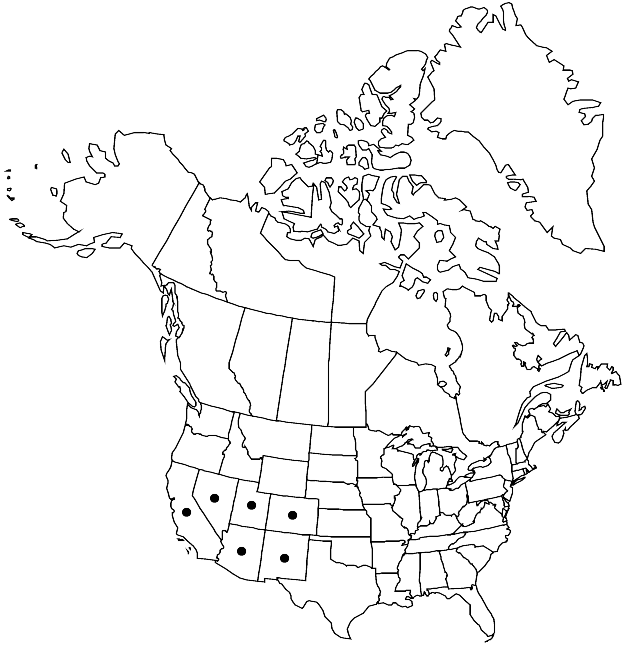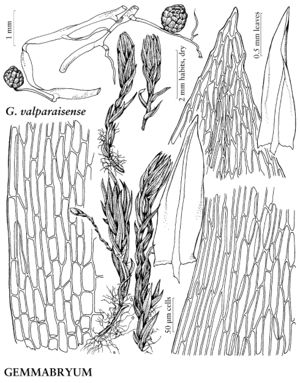Difference between revisions of "Gemmabryum valparaisense"
Phytologia 89: 112. 2007.
FNA>Volume Importer |
imported>Volume Importer |
||
| (6 intermediate revisions by 2 users not shown) | |||
| Line 9: | Line 9: | ||
|special_status={{Treatment/ID/Special_status | |special_status={{Treatment/ID/Special_status | ||
|code=F | |code=F | ||
| − | |label= | + | |label=Illustrated |
}} | }} | ||
| − | |basionyms={{Treatment/ID/ | + | |basionyms={{Treatment/ID/Basionym |
|name=Bryum valparaisense | |name=Bryum valparaisense | ||
|authority=Thériot | |authority=Thériot | ||
| + | |rank=species | ||
| + | |publication_title=Revista Chilena Hist. Nat. | ||
| + | |publication_place=12: 14, plate 4, fig. 1. 1917 | ||
}} | }} | ||
|synonyms={{Treatment/ID/Synonym | |synonyms={{Treatment/ID/Synonym | ||
|name=B. pyriferum | |name=B. pyriferum | ||
|authority=Crundwell & Whitehouse | |authority=Crundwell & Whitehouse | ||
| + | |rank=species | ||
}} | }} | ||
|hierarchy=Bryaceae;Gemmabryum;Gemmabryum sect. Tuberibryum;Gemmabryum valparaisense | |hierarchy=Bryaceae;Gemmabryum;Gemmabryum sect. Tuberibryum;Gemmabryum valparaisense | ||
| Line 33: | Line 37: | ||
|elevation=low to high elevations (0-1700 m) | |elevation=low to high elevations (0-1700 m) | ||
|distribution=Ariz.;Calif.;Colo.;Nev.;N.Mex.;Utah;Mexico;s South America (Chile);w Europe (Portugal);n Africa;Atlantic Islands (Canary Islands). | |distribution=Ariz.;Calif.;Colo.;Nev.;N.Mex.;Utah;Mexico;s South America (Chile);w Europe (Portugal);n Africa;Atlantic Islands (Canary Islands). | ||
| − | |discussion=<p>The typically bright green plants with small brown pyriform tubers, weak limbidium, and quadrate to short-rectangular cells uniform across the leaf base are diagnostic of Gemmabryum valparaisense. This species seems to be found primarily at calcareous springs or other seepy sites, unlike most of the other species in the section, which are found on disturbed soil.</p> | + | |discussion=<p>The typically bright green plants with small brown pyriform tubers, weak limbidium, and quadrate to short-rectangular cells uniform across the leaf base are diagnostic of <i>Gemmabryum valparaisense</i>. This species seems to be found primarily at calcareous springs or other seepy sites, unlike most of the other species in the section, which are found on disturbed soil.</p> |
|tables= | |tables= | ||
|references= | |references= | ||
| Line 42: | Line 46: | ||
-->{{#Taxon: | -->{{#Taxon: | ||
name=Gemmabryum valparaisense | name=Gemmabryum valparaisense | ||
| − | |||
|authority=(Thériot) J. R. Spence | |authority=(Thériot) J. R. Spence | ||
|rank=species | |rank=species | ||
| Line 56: | Line 59: | ||
|publication title=Phytologia | |publication title=Phytologia | ||
|publication year=2007 | |publication year=2007 | ||
| − | |special status= | + | |special status=Illustrated |
| − | |source xml=https:// | + | |source xml=https://bitbucket.org/aafc-mbb/fna-data-curation/src/2e0870ddd59836b60bcf96646a41e87ea5a5943a/coarse_grained_fna_xml/V28/V28_223.xml |
|genus=Gemmabryum | |genus=Gemmabryum | ||
|section=Gemmabryum sect. Tuberibryum | |section=Gemmabryum sect. Tuberibryum | ||
Latest revision as of 21:34, 5 November 2020
Plants small to medium-sized, bright green to yellow-green, rarely with reddish tinge. Stems 0.4–1(–2) cm; rhizoids brown to red-brown. Leaves densely imbricate, broadly lanceolate to narrowly ovate, flat to weakly concave, 0.4–1.5(–2) mm; base rarely weakly decurrent; margins plane to weakly revolute basally, entire to serrulate distally, limbidium absent or present, of 1 or 2 rows of elongate incrassate cells; apex acute; costa percurrent to short-excurrent, awn slender; alar cells rectangular, region not differentiated; proximal laminal cells gradually rectangular, 2–4:1; medial and distal cells 60–80 × 8–14(–16) µm, 4–6:1. Specialized asexual reproduction by rhizoidal tubers, on long rhizoids in soil and sometimes in proximal leaf axils, brown, pyriform, 40–80 µm, cells 15–20 µm, smooth to weakly protuberant. Sexual condition dioicous or rarely synoicous. Capsule suberect, inclined, or nutant, 2–3(–5) mm; peristome occasionally somewhat reduced; endostome cilia sometimes short or poorly developed.
Phenology: Capsules mature Mar–May (spring).
Habitat: Damp soil, soil over rock, associated with calcareous springs in arid to semiarid or Mediterranean climates
Elevation: low to high elevations (0-1700 m)
Distribution

Ariz., Calif., Colo., Nev., N.Mex., Utah, Mexico, s South America (Chile), w Europe (Portugal), n Africa, Atlantic Islands (Canary Islands).
Discussion
The typically bright green plants with small brown pyriform tubers, weak limbidium, and quadrate to short-rectangular cells uniform across the leaf base are diagnostic of Gemmabryum valparaisense. This species seems to be found primarily at calcareous springs or other seepy sites, unlike most of the other species in the section, which are found on disturbed soil.
Selected References
None.
